Applications will be accepted through May 1 and the state noted that cultivation and processing licenses are separate.
Ohio’s hemp program is one of just three approved by the United States Department of Agriculture.
Ohio’s hemp law was signed by Gov. Mike DeWine last July and includes a provision that prohibits hemp with more than three-tenths percent on a dry weight basis of tetrahydrocannabinol, or THC, which is the active ingredient that produces the high in marijuana.
MORE: What You Need to Know About CBD Oil
“Hemp is a cannabis plant, grown for its many industrial uses. It does not produce the intoxicating effects of the cannabis plant, marijuana,” according to Dept. of Agriculture officials. “Hemp yields a strong fiber, used in textiles. The seed has nutritional value and can be eaten, and Cannabidiol, or CBD, can be extracted from the plant. CBD is now being used in food and dietary supplements.”
The state department created hemp rules that went into effect on Jan. 29.
Farmers will be required to grow at least 1,000 plants on a minimum of a quarter acre, according to Ohio Department of Agriculture regulations. In addition, farmers will have to pay a proposed $100 application fee to be licensed to grow hemp and an additional $500 fee for each growing location.
The Ohio Farm Bureau says industrial hemp will give farmers another crop option and potential revenue stream that could offset “years of declining commodity prices.”
Julie Doran, the founder of the Oho Hemp Farmers Cooperative, said she plans to plant five acres of hemp on her farm in New Albany.
“It’ll really help those farmers out in Ohio,” Doran said. “Between trade wars and exporting of crops, us farmers have taken a big hit.”
MORE: Gov. DeWine signs law to decriminalize CBD oil, hemp products
About the Author
